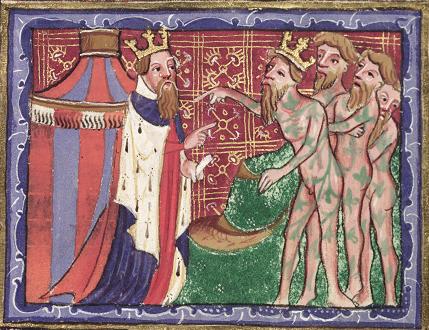Modern and medieval audiences both know Alexander the Great as a conqueror, but the events in Alexander and Dindimus (the unique English poem in Bodley 264) aren’t conquests, or mighty battles, or even long journeys. Instead, it is an exchange of letters between Alexander and a figure called King Dindimus. In the letters, Alexander questions Dindimus about the unusual ways in which he runs his kingdom, cut off as it is from Europe and European social norms.
This is a rare, but by no means unique, example of the ways in which medieval Europe came to terms with the mysterious and shadowy world beyond the borders of its own culture and knowledge. Dindimus is called ‘lord of bragmanus lond’ because of a misunderstanding: when Europeans encountered the word ‘brahmin’, they understood it to mean ‘an inhabitant of the land of Bragmanus’. In fact, it comes from a Sanskrit word meaning a member of one of the four varnas or castes in Hindu society. In this poem, we can see Christian Europe (in the person of Alexander) trying to make sense of the Hindu east at the dawn of the modern era.
Alexander ultimately rejects the society of the brahmins, and the poem makes it clear that the barrier between the two worlds cannot be bridged. Nevertheless, Dindimus shows himself to be a shrewd critic of Christendom, and points out hypocrisy and illogic in how it operates.
This is the end of this case-study. Where would you like to go now?
- Listen to some of the English poem being read
- Find out where you can read more about this manuscript
- Return to the beginning of the exhibition.
(Images reproduced by kind permission of the Bodleian Library, University of Oxford
http://image.ox.ac.uk/show-all-openings?collection=bodleian&manuscript=msbodl264)

